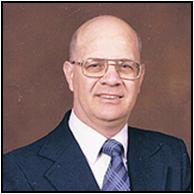 |
|
| Volume 20 Number 8 August 2018 | Page 12 |
Russ Vickers
 Physical limitations can be frustrating for many people. My grandmother Vickers passed away in the year 2000. For years, she had rheumatoid arthritis and had numerous operations on her hands, feet and other joints in her body. Even with her pain and limitations, she could still make me a cheeseburger on a Friday night or do cross-stitching to help her dexterity.
Physical limitations can be frustrating for many people. My grandmother Vickers passed away in the year 2000. For years, she had rheumatoid arthritis and had numerous operations on her hands, feet and other joints in her body. Even with her pain and limitations, she could still make me a cheeseburger on a Friday night or do cross-stitching to help her dexterity.
We can get frustrated by the restrictions of age or maybe a chronic illness. Perhaps someone must care regularly for a child who has MS or for a spouse in need of care. Or, maybe we know someone who is bedridden or shut in and cannot serve the way he or she would like to serve. Yet, we can use those limitations for growth, no matter what others may say or think about us.
In Matthew 6, Jesus continued the Sermon on the Mount by giving principles for spiritual living by giving to the needy (1-4), an example for our prayers (5-15) and fasting (16-18). Jesus mentioned in Matthew 6:18, “and thy Father, which seeth in secret, shall reward thee openly.” Think about how our limitations can be used to God’s glory and honor. They help separate us from the notion of having to be seen or heard by those around us. If we give charitably, pray or fast to let others see how religious we are, then we have done nothing, and we will not have God’s blessing. We cannot concentrate on ourselves instead of on God and on our fellowman and still be pleasing to God.
God always commends hidden spirituality. He hears every prayer done in secret. He sees every gift given in secret. He rewards those who are humble in their devotion to Him. What God sees and knows about us is what truly matters. So, when we think we are hindered by our limitations, think about this, “God can use even me!”![]()
[Editor’s Note: Physical limitations don’t have to hinder spirituality. In addition, anyone whose mind continues to be alert despite physical impairments can pray for even others. We all need effectual prayers prayed on our behalf. However, physical limitations in others provides the child of God an opportunity to act out his or her Christianity. ~ Louis Rushmore, Editor]
Donald R. Fox
 One thing we humans have in common is that we all make mistakes. I would be very leery of anyone who said that they never made a mistake. Webster defines mistake in part, “to understand or perceive wrongly; a blunder; error; misunderstanding.”
One thing we humans have in common is that we all make mistakes. I would be very leery of anyone who said that they never made a mistake. Webster defines mistake in part, “to understand or perceive wrongly; a blunder; error; misunderstanding.”
Years ago, a friend of ours, a preacher, stated he never made a grammatical mistake during a sermon. My wife took notes throughout his next sermon; she is much better in English grammar than I am. You guessed it—our friend made several blunders. We pointed out his mistakes, and we all had a jolly good-natured laugh about this. He never was boastful anymore concerning his grammatical excellence. A lesson learned!
Most normal people have learned to cope and to correct mistakes the best they can. That is why many of us apologize and make things right. Sadly, and often times, a blunder can be deadly or very costly. Nearly all of us recognize a mistake, an error or a misunderstanding can cause a terrible accident or the like. We also understand, and rightly so, that such mistakes are all part of the human factor, a part of life.
In Luke 2:41-52, there is an account of Mary and Joseph misplacing Jesus. “But they, supposing him to have been in the company, went a day’s journey; and they sought him among their kinsfolk and acquaintance” (Luke 2:44 KJV). Mary and Joseph made a mistake. They made a blunder; they perceived wrongly. We know that this mistake was not done on purpose and correction of the error was made.
As we make blunders and mistakes, let us make corrections the best we can. As humans, we can do no more. In the correction of our mistakes, truth should guide us to set things right. Truth and honesty are always the best course to resolve all blunders and mistakes. “And ye shall know the truth, and the truth shall make you free” (John 8:32). “If we confess our sins, He is faithful and just to forgive us our sins and to cleanse us from all unrighteousness” (1 John 1:9 NKJV).![]()